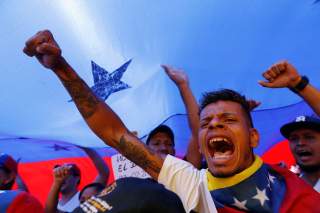America Shouldn't Invade Venezuela
America should not repeat the mistakes of the past.
The Venezuelan people are suffering, but so are the peoples of Eritrea, Syria, Saudi Arabia, Iran, North Korea, Egypt, Democratic Republic of the Congo, Yemen, Myanmar, Zimbabwe, and many more nations. Ironically, Washington supports, aids, and comforts the oppressor in several of these cases. In others, the Trump administration simply ignores friends acting badly. Nothing occurring in Venezuela justifies America embarking upon another war of choice.
Fear that the administration is inclined toward war caused Senate Democrats to insist that any resolution backing Guaidó include explicit disapproval of U.S. military action. Senator Marco Rubio (R-Fl.) refused the accept the measure with such a prohibition. “The U.S. always reserves the right on use force and protect its own national security interest and the interest of its personnel. So anything that would run counter to that would be problematic.” But he is being disingenuous since he routinely treats military action as a first resort.
Venezuela’s Guaidó suggested that he might come to welcome, even “authorize,” U.S. military action, though that “is not the form we hope for and believe in.” He also suggested that all options are on the table, the standard mantra of American officials who threaten war, and later argued that if the Maduro government blocked delivery of outside aid, that military intervention would be warranted under the UN “responsibility to protect” doctrine. However, as Representative Ro Khanna (D-Ca.) responded: “Mr. Guaidó, you can proclaim yourself leader of Venezuela but you don’t get to authorize U.S. military interventions. Only the U.S. Congress can do that. We will not.” And it should not.
Initiating another war of choice simply because the United States could do so would further unbalance American foreign policy. These days policymakers find it difficult to resist the temptation to use America’s overwhelming military power even though consequences are routinely ill. War should be a genuine last resort.
Secretary of State and later President John Quincy Adams appeared to foresee our world when he warned Americans not to go “abroad, in search of monsters to destroy” lest they risk their nation’s soul. The U.S. “might become the dictatress of the world” and “be no longer the ruler of her own spirit.” Which would be too high a price to pay.
The president appears to believe that an invasion would be easy, last year arguing that “It’s a regime that frankly could be toppled very quickly by the military, if the military decides to do that.” But believing the next war to be a cakewalk is a far too common mistake made by overly-optimistic political leaders. Most wars turn out far different and more costly than expected. For instance, in 1812 House Speaker Henry Clay declared that conquering Canada would be “a mere matter of marching.” More than two centuries later, of course, America’s northern neighbor remains free.
The only recent Latin American precedent was the 1989 invasion of Panama. However, circumstances were significantly different: a much smaller nation, ruled by a dictator with little popular backing, containing the U.S.-constructed canal long controlled by Washington. American troops already were stationed there, and the local government had killed several U.S. civilians.
The Maduro regime obviously would lose any conflict. Its armed services have suffered from years of economic crisis. Chávez purged potentially dissident officers in order to coup-proof the military, meaning trustworthiness trumped competence. Moreover, the army became a source of patronage and bulges with useless generals.
Nevertheless, there are capable units—special forces, airborne, and counter-insurgency, for instance. Admiral Faller told the Senate Armed Services Committee that the Venezuelan military, though a “degraded force,” nevertheless “remains loyal to Maduro—and that makes it dangerous.” Moreover, the civil militia has an official membership of 1.6 million. Just last month 86 percent of Venezuelans said they opposed foreign military action. Invaders might not find themselves hailed as liberators even by those hoping for an end to Maduro’s misrule.
Urban resistance could prove difficult to quell, especially by soldiers dispersed into guerrilla units. Resistance also could turn into a civil war, further inflaming social divisions which would make fixing Venezuela even tougher. Having broken Venezuela with an invasion, America would feel great pressure to occupy and rebuild it.
Through this process, the Chavistas might shift blame for their misrule onto their new occupiers. Washington would own the results of its war. American support would undermine the new government’s legitimacy. And ousting Maduro would not resolve the underlying political conflicts which triggered Chávez’s rise. Overall, the costs of exercising the military option are obvious; the benefits less so.
Unfortunately, as time passes Washington appears to have another potential foreign policy debacle in the making. Guaidó’s announcement led to expectations of a speedy denouement: sanctions would crush the regime, military elites would defect and defenestrate Maduro, Chavista elites would accept the offer of amnesty and depart, and a new regime would emerge, fulfilling American objectives. Increasingly a peaceful U.S. victory appears unlikely.
Alas, no one, it seems, has an alternative approach. Reported Bloomberg: “U.S. policymakers and those around Guaidó—as well as leaders in Brazil and Colombia—are eying one another and worrying about failure. Officials in each camp have said privately they assumed the others had a more developed strategy.”
Evidently not. The situation would have the makings of comedy sitcom if the stakes weren’t so high. So now what?
Washington should lower its expectations and step back, leaving regime transformation to Venezuelans and their neighbors. Most important, President Trump should keep the troops at home. Simón Bolívar, the heroic revolutionary who liberated Venezuela from Spain, long ago intoned: “when tyranny becomes law, rebellion is a right.” But in this case, that right should be exercised by Venezuelans, not Americans.
Doug Bandow is a Senior Fellow at the Cato Institute. A former Special Assistant to President Ronald Reagan, he is author ofForeign Follies: America’s New Global Empire.
Image: Reuters

